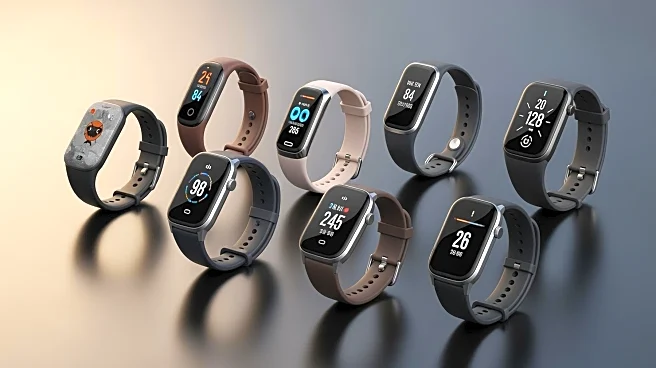What's Happening?
A variety of fitness trackers are available to help individuals monitor their physical activity and health metrics. These devices range from basic pedometers to advanced smartwatches, catering to different needs and budgets. The Fitbit Inspire 3 offers
basic step tracking and wellness features, while the Fitbit Charge 6 provides real-time heart rate monitoring and connectivity with exercise machines. The Fitbit Versa 4 includes GPS and advanced wellness features, and the Oura Ring 4 offers comprehensive health tracking in a wearable ring format. Apple Watches, including the SE and Series 11, provide step tracking, heart rate monitoring, and additional health notifications. Garmin's Forerunner 55 is designed for runners with GPS tracking and training tools. The Amazfit Helio strap offers step and health tracking without a screen, and the GRV fitness tracker provides basic workout tracking. For those seeking simplicity, a clip-on pedometer is available for basic step counting.
Why It's Important?
Fitness trackers play a crucial role in promoting physical activity and health awareness among users. By providing real-time data on steps, heart rate, and other health metrics, these devices encourage users to maintain an active lifestyle and monitor their wellness. The availability of various models ensures that individuals can choose a tracker that fits their specific needs, whether they are casual walkers or serious athletes. The integration of advanced features like GPS and heart rate monitoring in some models enhances the ability to track and improve fitness routines. Additionally, the inclusion of wellness features such as stress management and sleep tracking supports overall health management, making these devices valuable tools for personal health monitoring.
What's Next?
As technology continues to advance, fitness trackers are likely to incorporate even more sophisticated features, such as enhanced AI-driven health insights and personalized fitness recommendations. Manufacturers may focus on improving battery life and connectivity options to offer seamless integration with other health and fitness apps. The market for fitness trackers is expected to grow, driven by increasing consumer interest in health and wellness. Companies may also explore partnerships with healthcare providers to offer more comprehensive health monitoring solutions. The development of new models with innovative features could further expand the appeal of fitness trackers to a broader audience.
Beyond the Headlines
The rise of fitness trackers reflects a broader cultural shift towards health consciousness and self-monitoring. These devices not only provide data but also empower users to take control of their health and fitness journeys. The ethical implications of data privacy and security are important considerations, as these devices collect sensitive health information. Manufacturers must ensure robust data protection measures to maintain user trust. Additionally, the accessibility of fitness trackers can contribute to reducing health disparities by providing affordable options for health monitoring.
















